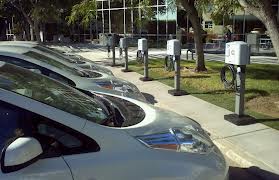 As automakers reduce prices on their plug-in electric vehicles, how does the cost of ownership compare to fuel-efficient internal combustion engine vehicles?
As automakers reduce prices on their plug-in electric vehicles, how does the cost of ownership compare to fuel-efficient internal combustion engine vehicles?
- Ford Motor Co. just joined the price war reducing the base price of its Focus EV from $39,200 to $35,200. With the federal tax incentive, the price goes down to $27,700 and some states are offering their own incentives (i.e., California is taking another $2,500 off the price).
- Honda cut monthly payments of a 36-month lease on its Fit EV from $389 to $259.
- Leasing made up about 93% of electric vehicle sales deliveries in Q4 2012, according to Experian Automotive.
- Maintenance costs are lower on EVs compared to ICEs. You don’t take them in for oil changes and basic service as you do with a gasoline engine car.
- As for the cost of the energy needed to keep the car moving, the US Dept. of Energy has started up a fueling indicator called eGallon. On average, fueling your car with gasoline costs about three times more than powering it with electricity. On a given day, the average US price of gasoline was $3.65 per gallon and the cost per mile equivalent for electricity was $1.14 for an electric eGallon.
Long term lifecycle costs for EVs are still unknown – unless you’ve been driving one for several years, such as the limited number sold in the second half of the 1990s. As for the new generation of lithium-ion battery models, they’ve only been on roads since late 2010. The cost of the battery pack replacement is a big issue for analysts. However, with 93% of them being leased for now, battery life is yet to be much of a real concern – but the worry is always there. The Nissan Leaf has gone through this struggle in the past year with Leaf drivers in hot areas like Arizona being angry and vocal about the performance of the Leaf’s battery pack.
Phil Gott, Senior Director at IHS, said, “If you are going to compare the operating costs of an electric vehicle and take into account the battery costs, you need to take into account all the costs of maintenance and engine replacement.”
How many consumers will be doing that math while buying a car? “Nobody and that’s the reality,” Gott said.
EV sales are still small compared to the overall market – only 0.63% of new vehicle sales in the US during June. They’re not going away, but there are a few barriers to be crossed for these numbers to grow. Car shoppers need a lot more education and experience to address key concerns – limited range per charge; sparse charging infrastructure; vehicle reliability and durability; and total cost of ownership compared to what they’re driving now.
